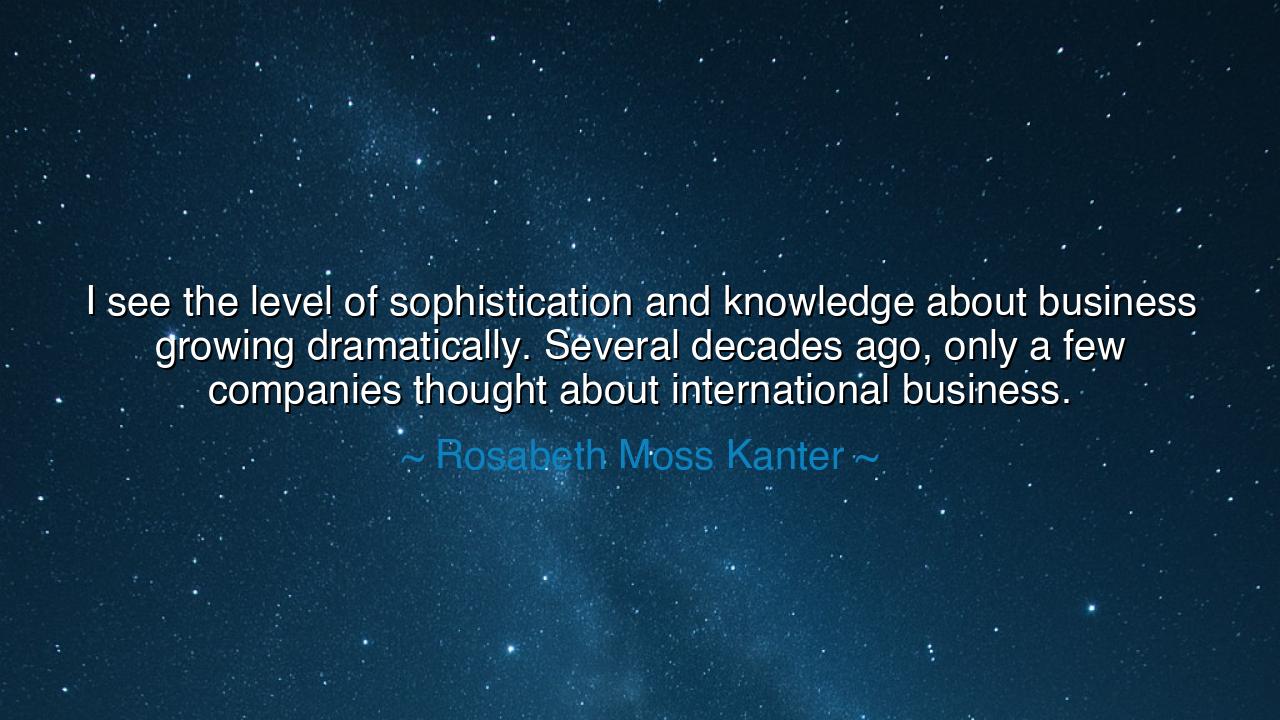
I see the level of sophistication and knowledge about business
I see the level of sophistication and knowledge about business growing dramatically. Several decades ago, only a few companies thought about international business.






In the far-seeing words of Rosabeth Moss Kanter, a scholar and visionary of modern management, we hear not just an observation of commerce, but a meditation on the evolution of human understanding: “I see the level of sophistication and knowledge about business growing dramatically. Several decades ago, only a few companies thought about international business.” Beneath these measured words lies the pulse of an age — the transformation of mankind’s trade from local markets to global networks, from isolated ambitions to interwoven destinies. Kanter speaks as one who has witnessed the dawn of a new era — an era where knowledge itself has become the greatest form of currency, and where the wise must learn not only to lead, but to comprehend the world as a single, living system.
To grasp the origin of this insight, one must first know the thinker behind it. Rosabeth Moss Kanter, a professor at Harvard Business School, rose to prominence during a time when the world’s economic order was being rewritten. The twentieth century had given birth to industrial empires built upon machines and manpower, but the close of the century demanded new wisdom — the mastery of information, collaboration, and culture. Kanter stood among those who saw that the world of business was no longer confined by borders. What she observed was not merely the growth of companies, but the awakening of consciousness within them — the recognition that success required understanding people, nations, and ideas beyond one’s own shore. In her voice, there is both pride and warning: that sophistication brings power, but only if it is guided by humility and vision.
When she says that “only a few companies thought about international business” in decades past, she reminds us how narrow the human imagination once was. There was a time when merchants feared distant lands, when nations built walls rather than bridges, when trade was seen as conquest rather than cooperation. Yet the spirit of commerce — like the human spirit itself — is restless. It yearns to connect, to explore, to discover the patterns of prosperity that bind all peoples together. Just as the ancient Silk Road linked the East and the West not only through goods, but through ideas, so too does modern globalization weave together minds, markets, and missions. What Kanter saw was the unfolding of this new interdependence, where the success of one nation no longer comes from domination, but from the sharing of knowledge across borders.
Her words echo the lessons of history. Consider the story of Prince Henry the Navigator of Portugal, who in the fifteenth century dreamed of discovering new worlds. He did not sail himself, but he founded a school of navigation — a place where sailors, cartographers, and astronomers from many lands shared their wisdom. It was there that the maps of the known world were redrawn, leading to discoveries that reshaped humanity’s destiny. Yet Henry’s true legacy was not the conquest of lands, but the creation of a knowledge network, one that transformed fear of the unknown into curiosity for the possible. In the same way, Kanter’s vision for business is not about expanding empires, but about cultivating intelligence that unites rather than divides.
The meaning of her words stretches far beyond boardrooms and economies. She speaks of the evolution of collective intelligence — the shift from isolated ambition to shared understanding. As humanity’s tools have grown sharper, so too must its wisdom deepen. In the old world, knowledge was hoarded by the few; in the new, it must flow freely among the many. For when knowledge expands, so does empathy — and when empathy grows, cooperation becomes possible. The companies Kanter admired were not those that sought only profit, but those that understood that to know the world is to serve it. The greatest enterprises, like the greatest civilizations, rise not through dominance, but through contribution — through the building of bridges across oceans, cultures, and minds.
But there is also a subtle warning woven into her praise. As the sophistication of business grows, so too does its responsibility. Knowledge without morality is a blade without a hilt — sharp, powerful, but perilous to its wielder. The global reach that Kanter describes demands a new kind of leadership — one that acts not only with intelligence, but with conscience. For as companies grow vast, they must remember the small: the worker, the village, the ecosystem. To lead in the age of knowledge is to understand that wisdom is not measured by wealth, but by the well-being it creates.
The lesson that emerges from Kanter’s reflection is thus both practical and profound. If you would prosper in the modern world, seek not only skill, but understanding — not only strategy, but perspective. Learn the languages of other peoples, not merely their tongues, but their values, their rhythms, their dreams. Build enterprises not as fortresses, but as gardens — places where ideas cross-pollinate and innovation blooms. For in a world ever more connected, success belongs not to the powerful, but to the perceptive; not to the loud, but to the wise.
So let us take Kanter’s words as a call to higher stewardship in all our endeavors. The age of ignorance is ending, and the age of global consciousness has begun. Whether we labor in commerce, art, science, or community, we are now participants in one vast conversation — the dialogue of humanity striving to understand itself. Let us, therefore, be among those who study, listen, and lead with both courage and compassion. For knowledge, when joined with purpose, becomes more than an advantage; it becomes the light by which civilization finds its way forward.






AAdministratorAdministrator
Welcome, honored guests. Please leave a comment, we will respond soon